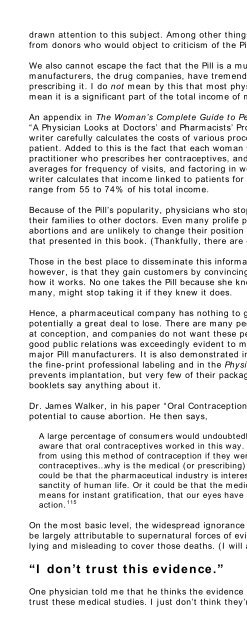Does the Birth Control Pill Cause Abortions
Does the Birth Control Pill Cause Abortions
Does the Birth Control Pill Cause Abortions
Create successful ePaper yourself
Turn your PDF publications into a flip-book with our unique Google optimized e-Paper software.
drawn attention to this subject. Among o<strong>the</strong>r things, organizations fear a loss of financial support<br />
from donors who would object to criticism of <strong>the</strong> <strong>Pill</strong>.<br />
We also cannot escape <strong>the</strong> fact that <strong>the</strong> <strong>Pill</strong> is a multi-billion dollar worldwide industry. Its<br />
manufacturers, <strong>the</strong> drug companies, have tremendous vested interests. So do many physicians<br />
prescribing it. I do not mean by this that most physicians prescribe it primarily for financial gain; I do<br />
mean it is a significant part of <strong>the</strong> total income of many practices.<br />
An appendix in The Woman’s Complete Guide to Personal Health Care, by Debra Evans, 114 is entitled<br />
“A Physician Looks at Doctors’ and Pharmacists’ Profits from Prescribing <strong>Birth</strong> <strong>Control</strong> <strong>Pill</strong>s.” The<br />
writer carefully calculates <strong>the</strong> costs of various procedures and comes up with a cost summary per<br />
patient. Added to this is <strong>the</strong> fact that each woman with a family will take her children to <strong>the</strong> family<br />
practitioner who prescribes her contraceptives, and usually her husband will go to that doctor. Using<br />
averages for frequency of visits, and factoring in word of mouth or patient-to-patient referral, <strong>the</strong><br />
writer calculates that income linked to patients for whom <strong>the</strong> doctor prescribes birth control pills<br />
range from 55 to 74% of his total income.<br />
Because of <strong>the</strong> <strong>Pill</strong>’s popularity, physicians who stop prescribing it will likely lose many patients and<br />
<strong>the</strong>ir families to o<strong>the</strong>r doctors. Even many prolife physicians resist <strong>the</strong> notion that <strong>the</strong> <strong>Pill</strong> causes<br />
abortions and are unlikely to change <strong>the</strong>ir position or even share with <strong>the</strong>ir patients evidence such as<br />
that presented in this book. (Thankfully, <strong>the</strong>re are certainly exceptions to this.)<br />
Those in <strong>the</strong> best place to disseminate this information are <strong>the</strong> <strong>Pill</strong>-manufacturers. The problem,<br />
however, is that <strong>the</strong>y gain customers by convincing <strong>the</strong>m <strong>the</strong> <strong>Pill</strong> works, not by teaching <strong>the</strong>m exactly<br />
how it works. No one takes <strong>the</strong> <strong>Pill</strong> because she knows it prevents implantation. But some, perhaps<br />
many, might stop taking it if <strong>the</strong>y knew it does.<br />
Hence, a pharmaceutical company has nothing to gain by drawing attention to this information, and<br />
potentially a great deal to lose. There are many people in America who profess to believe life begins<br />
at conception, and companies do not want <strong>the</strong>se people to stop using <strong>the</strong>ir pills. This concern for<br />
good public relations was exceedingly evident to me in my conversations with staff members at four<br />
major <strong>Pill</strong> manufacturers. It is also demonstrated in <strong>the</strong> fact that <strong>the</strong>ir FDA-monitored disclosures in<br />
<strong>the</strong> fine-print professional labeling and in <strong>the</strong> Physician’s Desk Reference all mention that <strong>the</strong> <strong>Pill</strong><br />
prevents implantation, but very few of <strong>the</strong>ir package inserts and none of <strong>the</strong>ir colorful consumer<br />
booklets say anything about it.<br />
Dr. James Walker, in his paper “Oral Contraception: A Different Perspective,” points out <strong>the</strong> <strong>Pill</strong>’s<br />
potential to cause abortion. He <strong>the</strong>n says,<br />
A large percentage of consumers would undoubtedly refuse to use this form of birth control if <strong>the</strong>y were<br />
aware that oral contraceptives worked in this way. Also, a large number of physicians would refrain<br />
from using this method of contraception if <strong>the</strong>y were aware of <strong>the</strong> abortifacient mechanism of oral<br />
contraceptives…why is <strong>the</strong> medical (or prescribing) and consumer population so poorly informed It<br />
could be that <strong>the</strong> pharmaceutical industry is interested in making large profits without regard for <strong>the</strong><br />
sanctity of human life. Or it could be that <strong>the</strong> medical community has become so conditioned to supply<br />
means for instant gratification, that our eyes have been blinded to <strong>the</strong> eternal consequences of our daily<br />
action. 115<br />
On <strong>the</strong> most basic level, <strong>the</strong> widespread ignorance and blindness on this issue among Christians may<br />
be largely attributable to supernatural forces of evil which promote <strong>the</strong> deaths of <strong>the</strong> innocent while<br />
lying and misleading to cover those deaths. (I will address this in <strong>the</strong> Conclusion.)<br />
“I don’t trust this evidence.”<br />
One physician told me that he thinks <strong>the</strong> evidence I’ve cited is simply incorrect. He said, “I don’t<br />
trust <strong>the</strong>se medical studies. I just don’t think <strong>the</strong>y’re accurate.”



